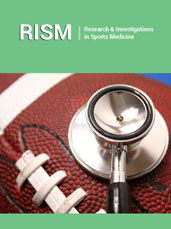- Submissions

Abstract
Research & Investigations in Sports Medicine
Using Exercise Therapy for Long COVID Without Screening for Post-Exertional Symptom Exacerbation Potentially Increases the Risks for Patients Who Suffer from it: A Reanalysis of Three Systematic Reviews
-
Open or CloseMark Vink1* and Friso Vink-Niese2*
1Independent Researcher, 1096 HZ Amsterdam, The Netherlands
2Independent Researcher, 49032 Osnabrück, Germany
*Corresponding author:Mark Vink, Independent Researcher, 1096 HZ Amsterdam, The Netherlands Email: markvink.md@outlook.com Orcid: https://orcid.org/0000-0003-1079-5647 Friso Vink-Niese, Independent Researcher, 49032 Osnabrück, Germany
Submission: October 01, 2024;Published: October 23, 2024

ISSN: 2577-1914 Volume10 Issue5
Abstract
Background: Three systematic reviews all concluded that exercise is an effective treatment for long COVID.
Objective: To determine if exercise therapy is also an effective treatment for long COVID patients who suffer from Post-Exertional Malaise (PEM) or Post-Exertional Symptom Exacerbation (PESE).
Method: The authors analyzed the evidence from three systematic reviews, and the trials in it, that all concluded that exercise is an effective treatment for long COVID.
Results and Discussion: Our reanalysis shows that there were a number of important issues with these reviews. The first systematic review reviewed the literature and investigated the benefits of exercise in healthy people. These were then extrapolated to long COVID even though one can only say something about the efficacy of a treatment for a particular condition if that treatment is actually investigated for that particular condition. The second systematic review included 32 exercise studies, yet 22 of those did not have a control group and only three of the remaining ten investigated exercise therapy for long COVID. The third systematic review included seven exercise studies for long COVID, yet five of them did not have a control group. Any causal inference about the efficacy of a treatment is impossible because of that.
The treatment groups in the remaining five studies from both systematic reviews were all small to very small. Additionally, all five studies used a badly designed control group. The proportion of PEM/PESE was not described by the studies or the systematic reviews, and none of the trials described the severity of it. It is unclear why they didn’t do that because the potentially harmful effects of exercise therapy for patients who suffer from PEM/PESE have been documented by many studies including the Living Guidance for Clinical Management of COVID-19 by the World Health Organization. Many health professionals think that post-exertional fatigue, i.e. tiredness after exercise, is PEM/PESE even though tiredness after exercise is simply a normal physiological response to exercise. The following four elements are essential for a diagnosis of PEM/PESE:
A. a disproportional worsening of symptoms,
B. following trivial physical or mental exertion,
C. with loss of strength and/or loss of function,
D. and an abnormally delayed recovery.
Conclusion: The three systematic reviews do not provide any evidence that exercise therapy is a safe and effective treatment for long COVID patients who suffer from PEM/PESE. Gradually increasing exercise is not an effective treatment for PESE/PEM, instead it is a diagnostic test, albeit a very harmful one which in the absence of effective pharmacological treatments, can render people bedridden for life. Consequently, patients who do suffer from PEM/PESE cannot do it, and patients who can do it, have been wrongly diagnosed with PEM/PESE. Additionally, the medical profession potentially increases the risks for the health of long COVID patients who suffer from PEM/PESE, by not excluding those patients from exercisetrials.
Keywords: COVID-19; Exercise intolerance; Long COVID; Post-COVID-19 condition; PEM; PESE; Post-exertional malaise; Post-exertional symptom exacerbation
 a Creative Commons Attribution 4.0 International License. Based on a work at www.crimsonpublishers.com.
Best viewed in
a Creative Commons Attribution 4.0 International License. Based on a work at www.crimsonpublishers.com.
Best viewed in 







.jpg)






























 Editorial Board Registrations
Editorial Board Registrations Submit your Article
Submit your Article Refer a Friend
Refer a Friend Advertise With Us
Advertise With Us
.jpg)






.jpg)














.bmp)
.jpg)
.png)
.jpg)










.jpg)






.png)

.png)



.png)






